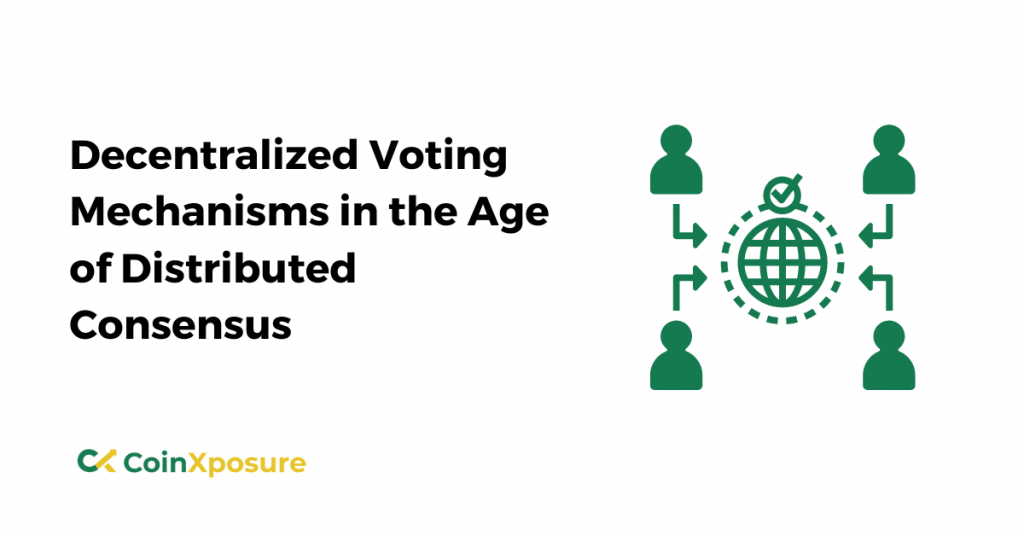In the contemporary landscape of governance and decision-making, decentralized voting mechanisms have emerged as a pivotal application of distributed consensus technologies.
As societies navigate the complexities of a digitally interconnected world, the fusion of decentralized voting with distributed consensus, often facilitated by blockchain and smart contract technologies, offers a transformative approach to elections and decision processes.
This article explores the synergy between decentralized voting mechanisms and the age of distributed consensus, highlighting the key features, advantages, and challenges that define this innovative paradigm in shaping transparent and secure voting systems.
Key Components of Decentralized Voting
Decentralized voting relies on key components, each playing a crucial role in ensuring the integrity, transparency, and security of the electoral process.
Blockchain Technology
Immutable and Transparent Nature: Utilizing a decentralized ledger, typically implemented through blockchain, ensures that once a vote is recorded, it cannot be altered or tampered with.
Security Features: The cryptographic principles inherent in blockchain provide a robust layer of security, guarding against unauthorized access and manipulation of voting data.
Smart Contracts
Automated Execution of Voting Rules: Smart contracts, self-executing code on a blockchain, automate the enforcement of voting rules. This eliminates the need for intermediaries and fosters trust in the execution of the voting process.
Trustless and Tamper-Resistant Processes: Through the use of smart contracts, decentralized voting systems can establish trust without relying on a central authority, and the tamper-resistant nature of these contracts enhances the overall integrity of the voting mechanism.
These components work in tandem to establish a decentralized, transparent, and secure voting infrastructure, fundamentally reshaping the traditional notions of electoral processes.
Advantages of Decentralized Voting
Decentralized voting brings forth several advantages that contribute to the evolution of transparent and secure electoral processes:
- Increased Transparency
- Enhanced Security
- Trustless Execution
- Reduced Intermediaries
Increased Transparency
Publicly Verifiable Records: Utilizing blockchain technology ensures that all transactions, in this case, votes, are recorded in a transparent and publicly accessible manner, allowing for scrutiny and verification by anyone.
Enhanced Security
Protection Against Fraud and Manipulation: The decentralized nature of the system, coupled with cryptographic security measures, guards against fraudulent activities and manipulation of voting data.
Resilience Against Single Points of Failure: Decentralized voting systems distribute data across a network of nodes, making it resistant to attacks on a single point of failure, thereby enhancing the overall security posture.
Trustless Execution
Smart Contract Automation: Smart contracts ensure the automated execution of voting rules without intermediaries, fostering trust in the fairness and accuracy of the electoral process.
Reduced Intermediaries
Elimination of Centralized Control: Decentralized voting minimizes reliance on central authorities, reducing the risk of bias, manipulation, or external influence in the decision-making process.
These advantages collectively contribute to a more trustworthy, inclusive, and resilient electoral framework, addressing some of the longstanding challenges of centralized voting systems.
Challenges and Considerations of Decentralized Voting
While decentralized voting brings notable advantages, it also faces challenges and requires careful considerations to ensure its effectiveness and widespread adoption:
- Scalability Issues
- Accessibility and Inclusivity
- Governance and Decision-Making
- Regulatory Compliance
- User Authentication and Identity Verification
Scalability Issues
Balancing Decentralization with Efficiency: As decentralized systems grow, scalability becomes a concern. Achieving a balance between decentralization and transaction processing speed is crucial to maintain efficiency in handling a large volume of votes.
Accessibility and Inclusivity
Addressing Barriers to Entry: Ensuring that decentralized voting systems are accessible to a broad spectrum of the population is essential. Addressing issues such as technological literacy, access to internet infrastructure, and availability of suitable devices is crucial for inclusivity.
Governance and Decision-Making
Establishing Consensus on Voting Rules: Decentralized systems often require consensus mechanisms for decision-making. Formulating and implementing governance models that align with the principles of fairness and inclusivity is a complex challenge.
Regulatory Compliance
Navigating Legal Frameworks: Adhering to existing legal frameworks and navigating regulatory environments can be challenging. Striking a balance between innovation and compliance is essential for the widespread acceptance of decentralized voting mechanisms.
User Authentication and Identity Verification
Ensuring Secure Identity Verification: Verifying the identity of voters in a decentralized system without compromising privacy is a challenge. Developing robust yet privacy-preserving identity verification mechanisms is crucial.
Addressing these challenges requires collaborative efforts from technologists, policymakers, and the public to create a decentralized voting ecosystem that is both secure and accessible, fostering trust in the democratic process.
Conclusion
The advent of decentralized voting mechanisms within the age of distributed consensus represents a transformative shift in the landscape of governance and decision-making.
The fusion of blockchain technology and smart contracts has ushered in a new era of transparent, secure, and trustless electoral processes. Despite the promising advantages, several challenges and considerations underscore the need for a nuanced approach to implementation.
Decentralized voting offers increased transparency through publicly verifiable records, enhanced security against fraud and manipulation, and the elimination of centralized control points.
Trustless execution, reduced reliance on intermediaries, and immutable record-keeping further contribute to the reliability of these systems. Moreover, decentralized voting fosters global accessibility, allowing for inclusive participation in electoral processes.
As technology continues to advance and societal attitudes toward decentralized systems evolve, the future holds the promise of refined solutions that address these challenges.
Collaborative efforts between technology developers, policymakers, and the public will be instrumental in shaping decentralized voting into a resilient, inclusive, and widely accepted cornerstone of democratic governance in the digital age.
